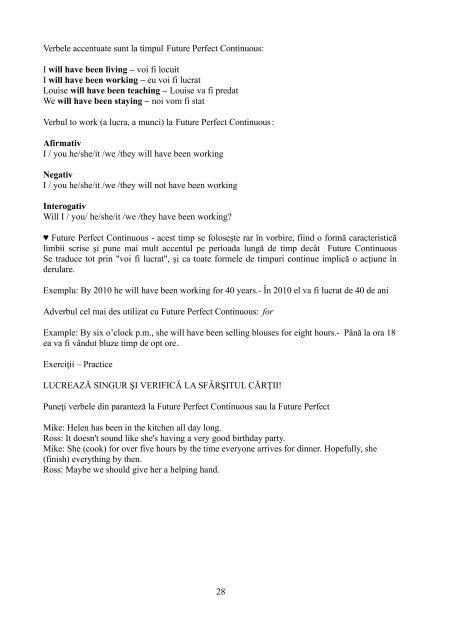Invata-Engleza-Fara-Profesor
Create successful ePaper yourself
Turn your PDF publications into a flip-book with our unique Google optimized e-Paper software.
Verbele accentuate sunt la timpul Future Perfect Continuous:<br />
I will have been living – voi fi locuit<br />
I will have been working – eu voi fi lucrat<br />
Louise will have been teaching – Louise va fi predat<br />
We will have been staying – noi vom fi stat<br />
Verbul to work (a lucra, a munci) la Future Perfect Continuous:<br />
Afirmativ<br />
I / you he/she/it /we /they will have been working<br />
Negativ<br />
I / you he/she/it /we /they will not have been working<br />
Interogativ<br />
Will I / you/ he/she/it /we /they have been working?<br />
♥ Future Perfect Continuous - acest timp se foloseşte rar în vorbire, fiind o formă caracteristică<br />
limbii scrise şi pune mai mult accentul pe perioada lungă de timp decât Future Continuous<br />
Se traduce tot prin "voi fi lucrat", şi ca toate formele de timpuri continue implică o acţiune în<br />
derulare.<br />
Exemplu: By 2010 he will have been working for 40 years.- În 2010 el va fi lucrat de 40 de ani<br />
Adverbul cel mai des utilizat cu Future Perfect Continuous: for<br />
Example: By six o’clock p.m., she will have been selling blouses for eight hours.- Până la ora 18<br />
ea va fi vândut bluze timp de opt ore.<br />
Exerciţii – Practice<br />
LUCREAZĂ SINGUR ŞI VERIFICĂ LA SFÂRŞITUL CĂRŢII!<br />
Puneţi verbele din paranteză la Future Perfect Continuous sau la Future Perfect<br />
Mike: Helen has been in the kitchen all day long.<br />
Ross: It doesn't sound like she's having a very good birthday party.<br />
Mike: She (cook) for over five hours by the time everyone arrives for dinner. Hopefully, she<br />
(finish) everything by then.<br />
Ross: Maybe we should give her a helping hand.<br />
28



